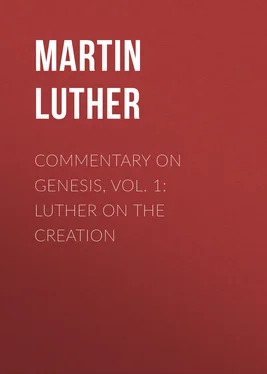Martin Luther - Commentary on Genesis, Vol. 1 - Luther on the Creation
Здесь есть возможность читать онлайн «Martin Luther - Commentary on Genesis, Vol. 1 - Luther on the Creation» — ознакомительный отрывок электронной книги совершенно бесплатно, а после прочтения отрывка купить полную версию. В некоторых случаях можно слушать аудио, скачать через торрент в формате fb2 и присутствует краткое содержание. Жанр: foreign_prose, foreign_religion, Философия, foreign_psychology, foreign_antique, на немецком языке. Описание произведения, (предисловие) а так же отзывы посетителей доступны на портале библиотеки ЛибКат.
- Название:Commentary on Genesis, Vol. 1: Luther on the Creation
- Автор:
- Жанр:
- Год:неизвестен
- ISBN:нет данных
- Рейтинг книги:4 / 5. Голосов: 1
-
Избранное:Добавить в избранное
- Отзывы:
-
Ваша оценка:
- 80
- 1
- 2
- 3
- 4
- 5
Commentary on Genesis, Vol. 1: Luther on the Creation: краткое содержание, описание и аннотация
Предлагаем к чтению аннотацию, описание, краткое содержание или предисловие (зависит от того, что написал сам автор книги «Commentary on Genesis, Vol. 1: Luther on the Creation»). Если вы не нашли необходимую информацию о книге — напишите в комментариях, мы постараемся отыскать её.
Commentary on Genesis, Vol. 1: Luther on the Creation — читать онлайн ознакомительный отрывок
Ниже представлен текст книги, разбитый по страницам. Система сохранения места последней прочитанной страницы, позволяет с удобством читать онлайн бесплатно книгу «Commentary on Genesis, Vol. 1: Luther on the Creation», без необходимости каждый раз заново искать на чём Вы остановились. Поставьте закладку, и сможете в любой момент перейти на страницу, на которой закончили чтение.
Интервал:
Закладка:
We therefore cease to follow more curiously the question why God added twice to the third day, "And God saw," etc., and omitted it on the second day. Nor will we conclude rashly whether the work of the second day was finished in the third day or not. Philosophers have handed down the rudiments of the arts and of the science of astronomy, and in doing so they divided the heaven into various spheres. We have a much simpler theory or science, in that we at once make God the immediate Creator of all things by his Word, Dixit , "And God said."
For how can we understand that order which God approves as such? Nay, our natural reason must here of necessity be confounded; for that which is order with God is in our judgment confusion. Hence the stars appear to us to be in a state of wild disorder; the bright being mingled with the more obscure, and the lesser with the greater. Who would judge this to be order? And yet it is consummate harmony; and so constituted by the all-wise Mind. And so we judge of other things. Our river Elbe seems a confusion; as do all other rivers also; because their streams empty themselves into the sea by winding courses. In the same manner trees seem to present a confusion. Nor do males and females in the world and their unions and combinations appear to be a state of order. All here also as to the appearance of things is disorder and confusion. All these things therefore unitedly prove that God possesses an order, and judges of it, differently from ourselves.
Cease we therefore to penetrate into these things with too much curiosity, why it is that God repeats the divine sentence in question twice during the work of the third day and omits it altogether in the work of the second day? Nor determine we rashly whether the work of the second day was finished on the third day or not. Philosophers laid down the rudiments of the arts and of the science of astronomy; and in so doing they divided the heaven into its various spheres. But we adopt a simpler and more true method of procedure and judgment; for we at once make God the immediate Creator of all things by his Word, "And God said."
PART III. GOD'S WORK ON THE THIRD DAY
I. V. 9a. And God said, Let the waters under the heavens be gathered together unto one place.
In the foregoing I observed that we do not understand the order of the works of God. Had he therefore asked us our opinion here we should have advised him to use such an order as to add the sentence now in question to the work of the second day. But God will ever be master of his own order and the ruler of the world. Wherefore we ought not to be over curious here. The text plainly declares that God commanded the waters "under the heavens to be gathered together unto one place." It does not say as before, V. 7, "under the firmament," where it is said, and God divided the waters which were "under the firmament" from the waters which were "above the firmament."
The heavens therefore, according to the phraseology and definition of the Scriptures, are the whole of the higher region and its machinery, together with the entire body of the air and all its spheres. The Hebrew name is derived from the material of which it is composed; namely, from that confused body of water, by the extension or expansion or multiplication of which it was formed. For that first body of unformed water was not so extensive in itself, but was so expanded or spread out by the Word. Just as Christ, according to the record of the Gospel, so multiplied a few loaves by his blessing as to make them suffice for a great multitude of men.
What therefore we philosophically call the air, with all its spheres, Moses here calls the heavens.
But by waters he means the waters of our seas and rivers, which were also formed out of that original unformed mass of water; or out of the dregs or lees of it, as it were, after the heavens had been formed or expanded out of it by the Word. I believe however that the nature and power of our water are far inferior to those of the heavenly waters. For our waters are, as I have said, the dregs, as it were, of the higher waters. So that they may be said to have been gathered together not only as to their place or position, but as to their body or substance, because these latter waters are heavier than those of the air or heaven. For we can breathe in the air, but we cannot breathe in the water.
And when Moses says that these waters were "gathered together unto one place" collectively, he is rather to be understood as speaking in a plural or distributive sense. As if he had said, that they were gathered unto various places; and not that the whole body of the waters was gathered unto one place, as one ocean, but that they were distributed into various seas and rivers; some higher up, and some lower down, some greater, and some less, etc.
V. 9b. And let the dry (land) appear.
These words claim particular attention, because Moses had just before said, that the earth was TOHU and BOHU; that is unformed, rude and uncultivated, mixed with waters and washed by the waters on every side. Here therefore Moses also means that this original mass of earth was sunk under the waters and covered by them. Otherwise, why should he represent God as saying "And let the dry land appear," if it had not been surrounded by the abyss of water and almost covered with these original nebulous mists or waters? For we have here a confirmation of that which I have repeatedly set forth; that the world, at its first formation, was nothing but a rude chaotic mass of water and earth; and now on the third day the earth is brought out and made to appear. As therefore at first the light was brought in upon the waters; so now, the beauty of that light is made to shine upon the earth. For both these qualities were necessary to render the earth habitable; that it should be "dry" and that it should be in the light or illuminated.
II. Moses now calls the earth "dry" on account of the removal of the original waters from it. Thus we behold the waters of the ocean rage and boil as if they would swallow up the whole earth. For the ocean stands higher than the earth. But it cannot pass its appointed bounds, for this spot of dry land circumscribes the earth of the first creation; and even opposes an insuperable barrier to original ocean-waters. Hence Job, 38th chapter, and the 104th Psalm bear witness that, although the sea is higher than the earth and is limited by no boundaries of its own, yet it cannot pass its boundaries appointed of God. For the earth, being the center of the world, would naturally be submerged and covered with the sea. But God keeps back the sea by his Word and thus makes the plane of the earth stand forth out of the waters, as far as is necessary for the habitation and life of man.
Hence it is by the power of God that the waters are prevented from rushing in upon us. God therefore performs for us to this day and will do so to the end of the world, the same miracle which he wrought for the children of Israel in the Red Sea, Ex. 14:21-22. But he made a special manifestation of his power by working the mighty miracle on that occasion, to the intent that he might bind that people, who were few in number, the more devotedly to his worship. And what else is this our life upon earth, but a passage through the Red Sea, where the high and threatening walls of water stand up on each side of us? For it is most certainly true that the sea is much higher than the earth. God therefore to this day commands the waters to hang suspended and holds them up by his Word that they may not break in upon us, as they burst in upon the world at the deluge. Sometimes however signs of God's power are still manifested, whole islands perish under the waters, whereby God shows that the mighty water is still in his hands, and that it is with Him either to hold it fast or to let it rush in upon the wicked and the ungrateful.
Читать дальшеИнтервал:
Закладка:
Похожие книги на «Commentary on Genesis, Vol. 1: Luther on the Creation»
Представляем Вашему вниманию похожие книги на «Commentary on Genesis, Vol. 1: Luther on the Creation» списком для выбора. Мы отобрали схожую по названию и смыслу литературу в надежде предоставить читателям больше вариантов отыскать новые, интересные, ещё непрочитанные произведения.
Обсуждение, отзывы о книге «Commentary on Genesis, Vol. 1: Luther on the Creation» и просто собственные мнения читателей. Оставьте ваши комментарии, напишите, что Вы думаете о произведении, его смысле или главных героях. Укажите что конкретно понравилось, а что нет, и почему Вы так считаете.












